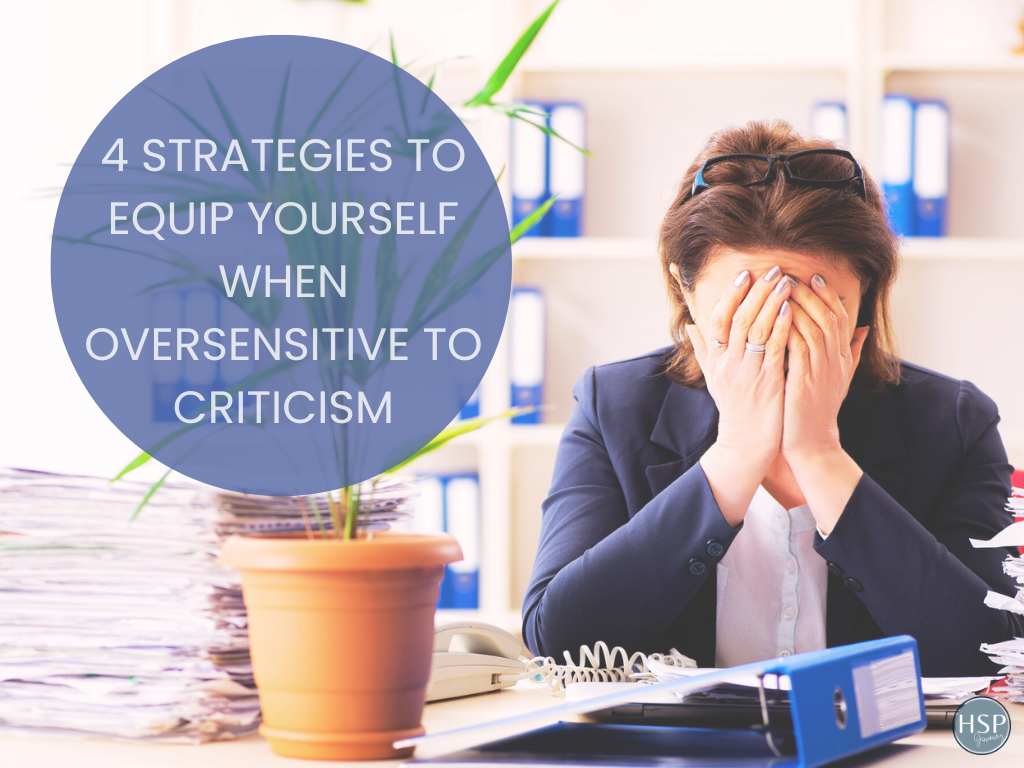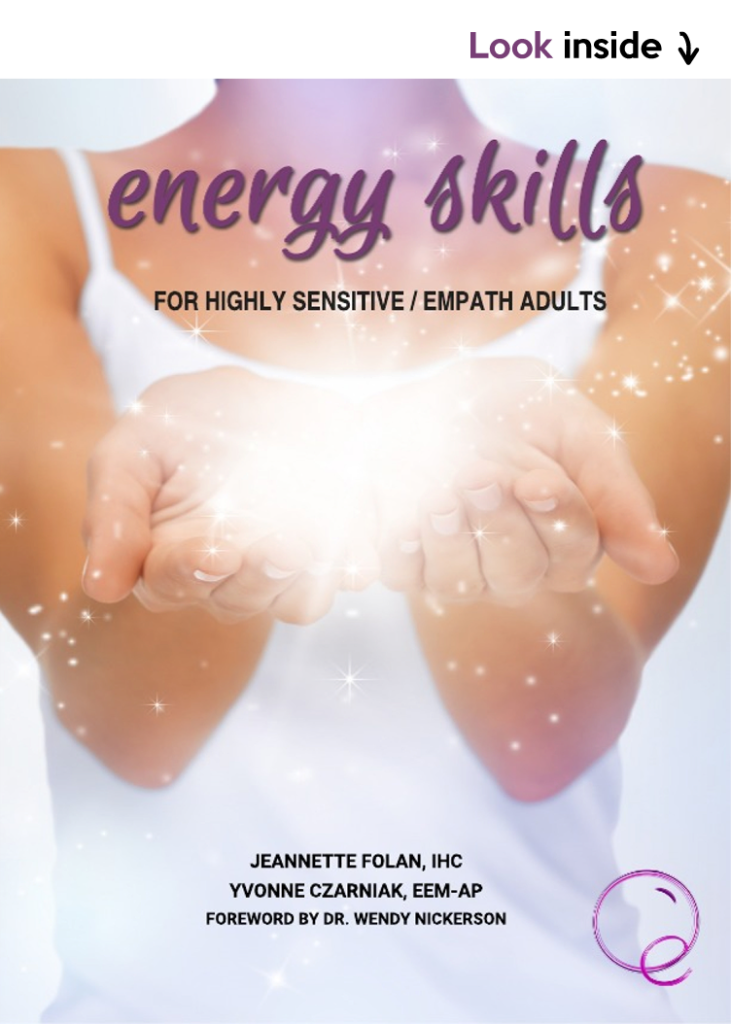If you’re a highly sensitive person, the word “criticism” might make you cringe. You may even consider it a dirty word. What others think to be constructive and helpful criticism can feel like destructive criticism to an HSP. In this article, we’ll explore why HSPs often struggle with criticism and offer some strategies for how to equip yourself when oversensitive to criticism.

Table of Contents
Why is criticism such a big deal to highly sensitive people?
- HSPs tend to be people pleasers. When someone conveys that we’ve done something that hasn’t pleased them, it can feel disappointing and even embarrassing.
- Some HSPs are also perfectionists, so criticism can feel like a failure to meet our own standards, leading us to have feelings of self-doubt and insecurity.
- Another common quality is the desire to fit in and be accepted. When criticized, feelings of rejection or abandonment may surface.
- To an HSP, criticism is perceived as a negative, even confrontational exchange. Our aversion to conflict makes it difficult to be open and accepting of criticism.
Learning how to handle criticism at work is a valuable skill for personal and professional growth.
Here are some suggestions to help HSPs navigate criticism effectively:
#1 – Change the Word from Criticism to Feedback
Quite simply, swap the word “criticism” for “feedback”. Criticism has a negative connotation. Feedback is neutral. Whether you’re thinking it or speaking to others at work, ban the word “criticism” from your vocabulary and use the word “feedback” instead. This will help you reframe your perspective on constructive criticism.
#2 – Build Your Resilience
Build your resilience to feedback (formerly known as criticism). To do this, you’ll first need to become aware that feedback comes in all forms. When you pay your friend a compliment on their outfit, that’s feedback. When someone honks their horn behind you because the light turned green two seconds ago, that’s feedback. As you begin to notice that feedback is happening all the time all around you — and that you’re a part of the giving and receiving of it — you can be more self-assured that you’ll be able to handle whatever feedback you might be given (because you’re already doing it!)
ENERGY SKILLS WORKBOOK
FOR HIGHLY SENSITIVE/EMPATH ADULTS
Can you imagine feeling more balanced, confident, and at ease? Are you ready to learn the skills to help shift your energy and emotions?
If you’re an HSP/empath who’s ready to feel more comfortable in your “sensitive skin”, this digital workbook is for you.
With over 100 pages of engaging, uplifting material — including 20 energy-shifting exercises and how-to videos — the Energy Skills Workbook for HSP/Empath Adults will help you develop awareness and adaptability, resulting in increased self-confidence and mental/physical wellness.
#3 – Change Your Subconscious Belief That Criticism is Hurtful/Painful
There are a few techniques to help you do this. You can meditate with a mantra such as “I accept all feedback with grace.” Another method is to use tapping (Emotional Freedom Technique) to clear any anxiety about criticism, and to clear limiting beliefs that you need to be perfect, that you need to please people all the time, or that someone’s assessment of your work activities is a reflection on your value as a person. Finally, you can work with an HSP coach or therapist and explore methods such as rational emotive therapy, cognitive restructuring, or schema therapy.
#4 – Participate in the Feedback
This means being an active listener, seeking clarification, and expressing gratitude to the person giving you feedback. This might feel uncomfortable at first and certainly, it’s not appropriate in every situation (if your manager expresses frustration because you turned in the report late, you don’t really need clarification, and an apology would be more suitable than a thank you). For more substantial feedback, however, such as during a performance review, your participation can help you from feeling that it’s an attack and instead give you a feeling of collaboration and empowerment.
Let’s face it — being sensitive to criticism is not one of the more helpful qualities of the highly sensitive trait. Yet criticism, feedback, and judgments are a part of life. They are around all the time, everywhere. Trying to avoid it or agonizing over it when it happens, is not a healthy way to live.
You can, however, empower yourself by changing your perspective, building your resilience, transmuting your self-limiting beliefs, and participating in the feedback. These steps can help you learn to handle any type of feedback more productively and use the feedback to enhance your skills and performance at work.

Why do so many people struggle with criticism?
Ego/Self-esteem – Criticism can feel like a personal attack on one’s abilities or character. This threatens our sense of self-worth and competence, which many people have a hard time accepting.
Emotional response – Criticism tends to evoke uncomfortable emotions like frustration, embarrassment, or defensiveness. These emotional reactions make it difficult to respond rationally.
Lack of perspective – It’s easy to take criticism very personally and have trouble seeing it objectively as feedback for improvement rather than a personal judgment.
Fear of failure – Criticism highlights our flaws and shortcomings, which many people try to avoid acknowledging out of a fear of being seen as a failure.
Confirmation bias – People often have a tendency to seek out and focus on information that confirms their existing beliefs, making them resistant to contradictory criticism.
Past experiences – If someone has experienced overly harsh or unfair criticism in the past, they may become hypersensitive to any criticism, even if it’s constructive.
Ultimately, being open to and learning from criticism is a skill that takes conscious practice–especially for highly sensitive people. Developing self-awareness, emotional intelligence, and a growth mindset can help people become more receptive to feedback. Also, reframing terms, opening up one’s mindset, and remaining available for growth and feedback can be key to navigating criticism.
Be sensitive, be free
*This post contains affiliate links and I will be compensated if you make a purchase after clicking on my links*






[…] negative aspects? This heightened complexity could potentially result in more turbulent waters in HSP relationships, even if they don’t culminate in […]